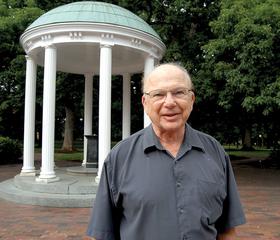Retired UNC prof
loses email in brouhaha
Premium
content from Triangle Business Journal - by Jason deBruyn
Date: Friday, July 1, 2011, 6:00am
EDT
Steve Wilson
Prof. Emeritus Elliot Cramer says he
did nothing wrong.
CHAPEL HILL – The expulsion of a
retired professor from the UNC-Chapel Hill email network has set off sparks of
dissent, with free speech advocates saying the administration bowed to
complaints from an outside “heckler.”
Prof. Emeritus Elliot Cramer
retired in 1994 but continued an affiliation with the university. He used his
official UNC-CH![]() email account for personal emails, including for the
Friends of Orange County Animal Shelter, or FOCAS, which has no affiliation
with UNC. He also created a focas@unc.edu email alias.
email account for personal emails, including for the
Friends of Orange County Animal Shelter, or FOCAS, which has no affiliation
with UNC. He also created a focas@unc.edu email alias.
Last year, New York resident Joseph
Villarosa asked about making a donation to FOCAS,
but wanted to know the group’s affiliation with UNC because of the email alias.
He inquired whether part of his donation would go to the university, according
to emails. Cramer explained that it would not, but Villarosa
accused Cramer of improperly using the university email account.
Cramer and Villarosa,
who had no prior association with UNC, exchanged emails of increasing intensity,
and Villarosa contacted UNC leadership, including
Chancellor Holden Thorp, demanding an apology from Cramer and that Thorp
expel the professor from the network.
For five months, the university
tried to “steer a neutral course and leave Dr. Cramer and Mr. Villarosa to their personal feud,” but decided to take
action against Cramer after “hours and hours of senior administrator time were
diverted to a cascade of email correspondence from both individuals,” according
to a letter from Leslie Chambers Strohm,
UNC-CH general counsel.
University leaders say they are
following provisions set out in the Personal Use Policy, especially since
Cramer retired more than 15 years prior, but the move has the Foundation for
Individual Rights in Education, or FIRE, up in arms.
The university initially defended
Cramer, but then acquiesced to Villarosa only because
he created such a hubbub, FIRE contends.
“Once the university has established
a set of rules, it has set a precedent,” says Will Creeley,
director of legal and public advocacy for FIRE. “Professors expect that when
they retire, the promise of network access will be honored. Now that UNC has
revoked the access it promised Cramer, it has set an equally bad precedent.”
Others claim to have problems with Villarosa as well. Susan Barrett with the N.C.
Shelter Rescue Inc. says she is under a “full throttle attack,” by Villarosa and has filed a “no-contact order” because of his
alleged harassment.
FIRE sent a letter to Thorp saying
it is “concerned about the threat to freedom of expression” because the
university revoked Cramer’s network access.
“You can’t change the rules in the
middle of the game” just because “one angry man was persistent enough,” Creeley says. “All you have to do is send them enough
emails, and they will get annoyed and they won’t ignore you. The university
seems to be talking out of both sides of its mouth.”
To university leaders, this is not a
First Amendment issue. The dispute elevated to a level that distracted others
at UNC-CH and distracted them from their responsibilities.
“The University’s decision to
disable Dr. Cramer’s Network privileges was not a response to the content or
viewpoint of Dr. Cramer’s speech, but a reasonable response to the actual and
significant disruption experienced by the University as a result of Dr.
Cramer’s use of a University resource,” according to Strohm.
At its core, Cramer says he is
confused as to how this issue has blown up so large.
“I have not a clue why (Villarosa) started this fight with me,” he says, pointing
out that FOCAS is a “tiny” organization that typically receives less than $500
in donations annually.
Contacted by email, Villarosa declined to comment.
Cramer says he has nothing against
Thorp and would like for the whole situation to go away so he can continue his
work of publishing research articles. Still, he does not want to simply back
down.
“I don’t want to hurt the
university, but to me it’s a matter of principle,” he says.
